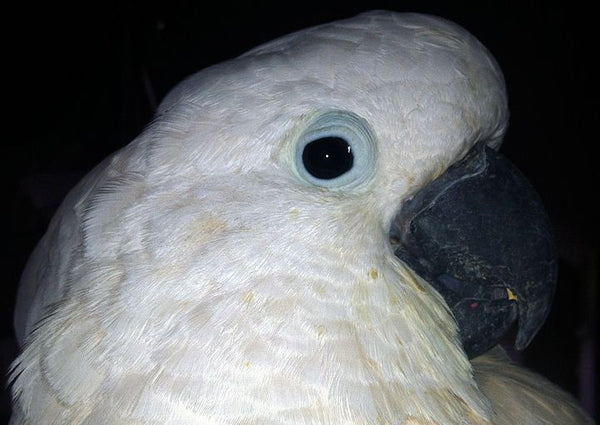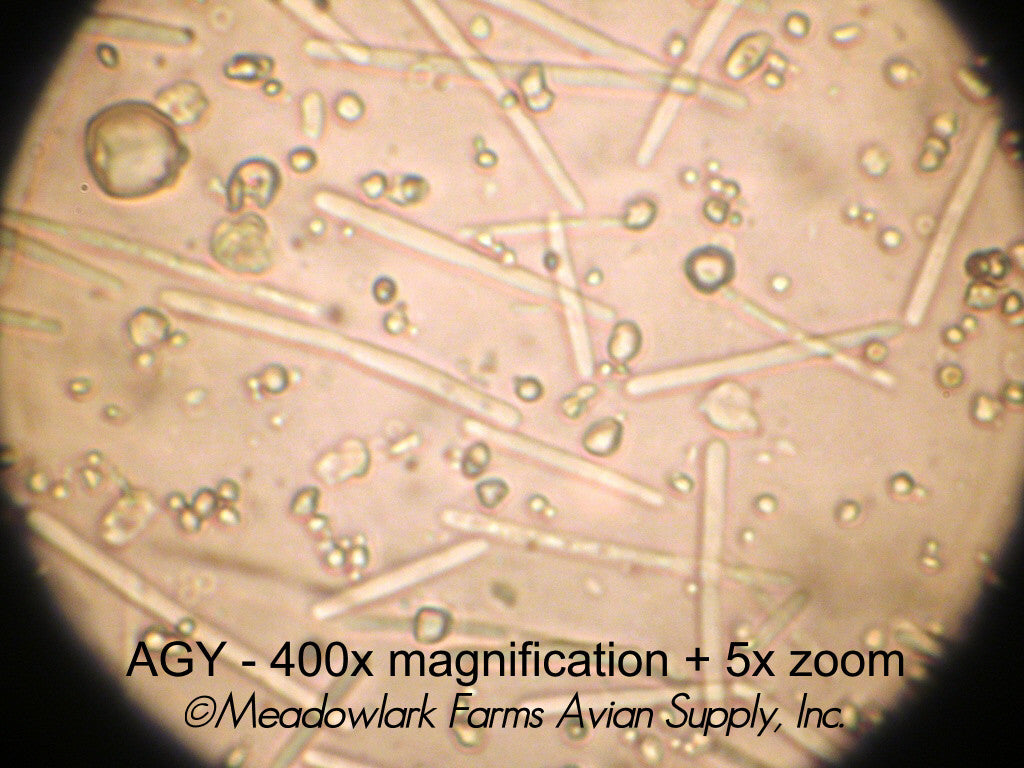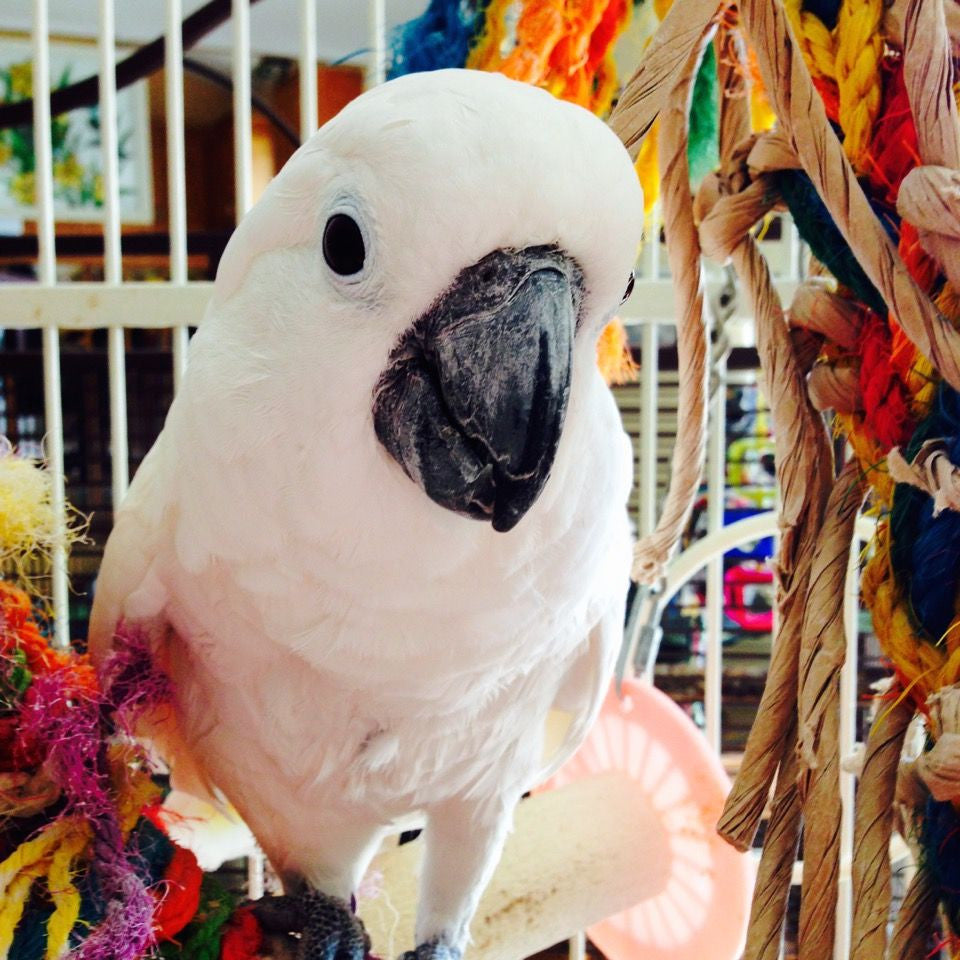Megabacteria, now known as Avian Gastric Yeast (AGY), is primarily seen in canaries, finches, lovebirds, cockatiels and budgies and sometimes in larger birds. This nasty disease looks an awful lot like PDD. And, boy is that a scary diagnosis. While rare in larger birds, it does happen and it is incredibly easy to diagnose with a fecal stain. Look at those long fungal rods on the left!
How do I know this? Well, Peachy, my 930 gm. Moluccan Cockatoo contracted this nasty disease when he became stressed following a painful toe injury. Now, if you know anything about me, I'm a bit of a clean freak. Peachy has a large cage, plenty of socialization and gets great care. Peachy, luckily, was used to a healthy diet of Harrision's Bird Food and plenty of fruits and vegetables. He also had routine checkups with our avian vet. So, Dr. Roeder didn't know to look for AGY when Peachy, a large parrot, presented with anorexia, weird poops and horrible weakness. He is big and I a clean.

As a matter of fact, AGY is so rare in larger parrots that both Dr. Roeder and Dr. LaBonde in Denver relied on the Colorado Veterinary School to suggest ruling out this weird disease. It's a $30+ test. Ruling out PDD is about $600 - $800. and quite invasive for the bird. The X-rays showed very large abdominal masses!
Getting technical, Megabacteria is an ascomycetous yeast that grows in the isthmus, or the narrow part of the stomach that is between the proventriculus and ventriculus. Although originally thought to be a bacterial infection (hence, the name Megabacteria) researchers have learned that fungal medications are highly effective in ridding a bird of this illness. So, now, we know MegaBacteria as Avian Gastric Yeast.
In a publication by Lucio J. Filippich of The University of Queensland, Queensland, Australia, he states that: "Megabacteria are large, gram positive, rod-shaped organisms that are being increasingly found worldwide in the proventriculus or droppings of several pet bird species, especially budgerigars and canaries."
Symptoms of Avian Gastric Yeast
Due to the severity of the symptoms, including very rapid weight loss, fast diagnosis and treatment are important. In the acute state birds may exhibit the following symptoms:
- Regurgitate blood & food
- Blood in the droppings
- Severe lethargy
- Fast, severe weight loss
- Fluffed up feathers
- Eliminating undigested food in their droppings
Dr. Speer reports that birds show signs of having a severe stomach ache. They have a fluffed appearance and may tuck their head under a wing. Some birds will sit on the bottom of the cage with closed eyes or have a look of severe pain.
Your vet can test your birds fresh droppings on a wet-mount slide viewed at 400 power or higher to see the large rod shaped yeast. Due to the size of the yeast, the disease is relatively easy to diagnose for the experienced avian vet. Untreated, the course of the disease may take months and there may be intermittent periods of recovery and relapse. Differential diagnoses include proventricular dilatation disease (PDD), lead, zinc or copper toxicoses, trichomoniasis, bacterial, mycotic or parasitic infections, and neoplasia. Recently, research has provided a reliable and safe diagnosis - plus treatment.
Currently, the most effective treatment is with the antifungal drug,oral Amphotericin B. It is believed that this medication attacks the cell membranes of fungi. Treatment is twice daily for 30 days. This medication is difficult to locate in an oral suspension so your vet may use a compounding pharmacy. It is available in several flavors. We had our script filled at a compound pharmacy. Peachy was on the medication plus on Metacam for 30 days. Untreated, he probably would have died.
Side effects of the anti-fungal drug are not pretty either. Peachy felt really bad for a month and started chewing at himself. He got anorexic, vomiting (gastrointestinal irritation), hypokalemia, and fever. We've found that allowing our bird to feed prior to administering the medication reduces the side effects.
Avian Megabacteria Can Happen to Any Bird
I was astounded that Peachy got AGY. I'm a clean freak. His cage is clean. His dishes are clean. He's bathed often. And, I never allow food and fecal matter to mix. I feed Harrison's and supplement with fresh fruits, veggies. Proper nutrition probably saved Peachy's life.
Evidently, according to our vets, a healthy, yet very stressed bird has these fungal rods in it's digestive tract and once health is compromised, the virus can go rogue.
Had I not known how to read Peachy's body language and had a baseline weight, I could have easily missed this horrible illness. Recovery has been a six month process, possibly because of that Cockatoo mentality, but Peachy's worth it. I'm still checking his weight daily and he's still on Metacam to reduce the incredible swelling in his gut, but, he is dancing his little jig and starting to sing again.
Take Aways for Avian Gastric Yeast - MegaBacteria
- Monitor your birds weight a minimum of weekly to know if your bird becomes anorexic. Since birds don't store food, a day of not eating and diarrhea are a big problem. Supplement your birds diet with Formula One and Electrovites.
- Learn to read your birds body language. I could tell by the look in Peachy's eyes that he was extremely sick.
- Have a strong relationship with your avian vet to get in and get treatment started fast.





